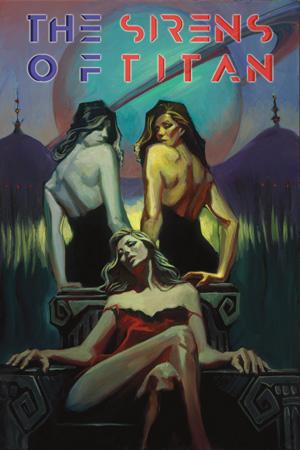 Courtesy: Sacred Fools Theatre Courtesy: Sacred Fools Theatre |
 Courtesy: International City Theatre Courtesy: International City Theatre |
“Sirens of Titan” and “Uncanny Valley” at the triple point of science, philosophy, and fiction are currently on stage at The Sacred Fools and International City Theatre, respectively. “Sirens,” adapted from Vonnegut’s 1959 novel, is sci-fi a la Bradbury: Mars-centric on the outside, fully optional physics, and Earth-facing at its core. Wealthy Winston Rumfoord and his large dog travel space for the hell of it and get caught in a dimensional swirly that puts them everywhere at once and localized on Earth on occasion. Rumfoord’s role is to make the lives of his wife Beatrice, sybarite Malachi Constant, and thousands of other dispensable earthlings a living hell. He press-gangs this lot into forced military servitude on Mars and dispatches most of them back to Earth to be annihilated in an intentionally futile war. A united and victorious Earth then congeals around a faith where God is entirely apathetic and humankind does what it can with itself. Beatrice, Malachi, and their son Chrono are interplanetary Jobs suffering torments at Rumfoord’s hands through a fixed and unalterable timeline, ending up on the largest moon of Saturn. Vonnegut has issues with free will and everyone is more-or-less along for a nasty ride in an uncaring Universe where Earth exists as a spare-parts depot for an Extremely Advanced Civilization from Far Far Away™.
Meanwhile, “Uncanny Valley,” a much more recent effort by Thomas Gibbons, looks at a mid-21st century where the very sick and staggeringly wealthy can offload their memories and essence into a robot body. It’s immortality of the kind that throws wrenches into the family machinery, especially when children are seeking their share of a giant inheritance. Asimov’s “I Robot” explored synthetic evolution through Susan Calvin, crusty robopsychologist to fifty years of U.S. Robots products. Her counterpart here is far less crusty but a psychologist all the same – Clare Hillis’s job is to oversee the commissioning of Julian, a ‘non-biological human,’ whose emergent personality will soon be subsumed by the tycoon who funded his creation to the tune of $240 million dollars.
“Sirens of Titan” the novel is relatively easy-to-read and occasionally engaging thanks to Vonnegut’s dry, cynical prose and gimlet eye on religion. The threads are hard to braid without periodic revisits to past chapters – who did what to whom and when? We can safely abandon ‘why’ because it is never satisfactorily addressed. A theatrical adaptation can’t offer flashbacks on demand and it is difficult to follow let alone decode the underlying philosophical argument – if it exists – linking the vignettes. “Sirens” may have influenced Douglas Adams with prescient references to infinite improbabilities and hyperintelligent pandimensional beings running a planet-sized simulation for their own ends. The excellent stagecraft and mostly solid performances, staples of The Sacred Fools and carrying well into their new space, can’t fully frame the meandering story which caps off with a One Tin Soldier ending.
Vonnegut unfortunately can’t compete with a future he helped to create, Gibbons has to compete with exceptionally fine prior art in android sentience. The first act of “Uncanny Valley” is low-conflict set up. Clare and Julian flip Pygmalion as she teaches him the fine points of being a convincing gentleman while realizing that true societal acceptance may never come. Act two has Julian, imprinted with the past and the DNA of a now-dead man, visiting Clare on the eve of her retirement. He dredges Clare’s own painfully buried memories of an estranged daughter as his son asserts legal claims to his fortune and questions his continued existence. This all fizzes up towards the last quarter of the play and comes off as a contrived end to justify the beginning and the middle. Julian is now blessed with eternal life and eternal youth. Tithonus and the Struldbrugs would be jealous. There’s a fascinating question of whether he should merely continue as before or renounce the past, strike out in new directions, fully embracing his rebirth. Unfortunately, it comes too late to explore. Asimov and Dick, among others, have taken this general idea a lot farther. The second season of then fledgling Star Trek: The Next Generation had a dying genius impose his consciousness onto the android LCdr. Data (“Schizoid Man”). Three episodes later, Data had his status and rights as a sentient being legally challenged by an ambitious Starfleet officer with ulterior motives (“The Measure of a Man”). ICT’s stagecraft and cast are also reliably attractive although we are asked to believe that people in 2042 dress, talk, and use smartphone technology as they do today. In the end, Gibbons has dug himself a hole with his premise and can’t quite climb out of it.
But, one man’s miss can be another’s bulls-eye. Vonnegut devotees will undoubtedly appreciate a no-holds-barred attempt to stage a foundational story. Similarly those not fully co-opted by Star Trek and other science fiction staples may be able to engage with Gibbons on the offered terms.
Sirens of Titan
adapted by Stuart Gordon from the novel by Kurt Vonnegut, Jr.
directed by Ben Rock
March 31 – May 6, 2017 at The Sacred Fools Theatre
Fridays & Saturdays @ 8pm
plus Sundays, April 23 & 30 @ 7pm
Purchase tickets online
Uncanny Valley
by Thomas Gibbons
Directed by caryn desai
April 19 – May 7, 2017 at International City Theatre, Long Beach
Thu. – Sat. at 8pm
Sun. at 2pm
Purchase tickets online
or call the Box Office at 562-436-4610 (M-F 9am to 5pm)

